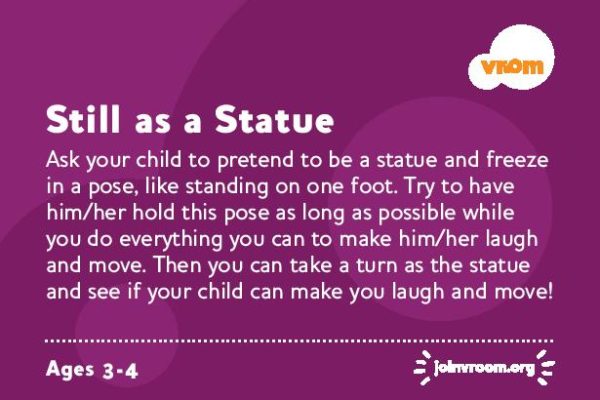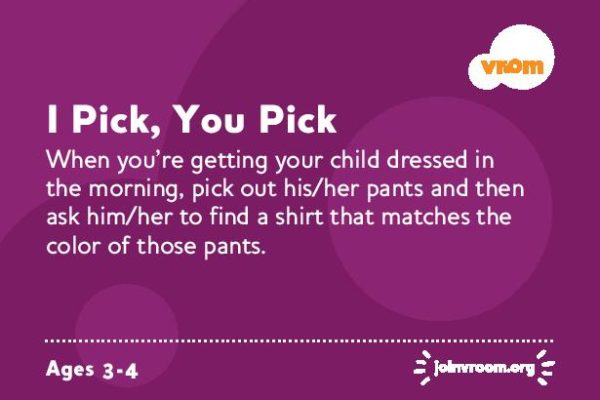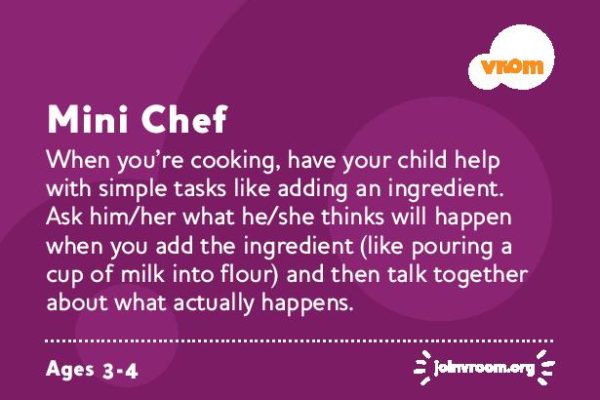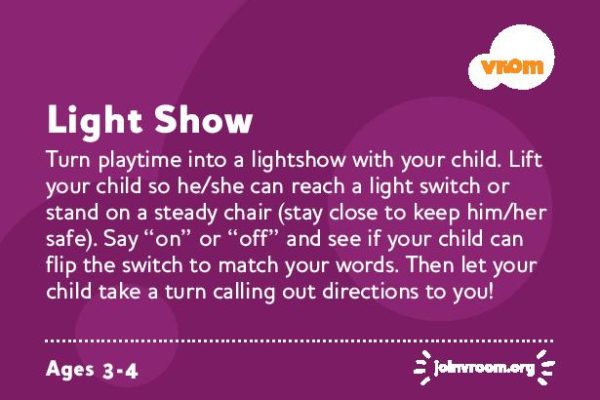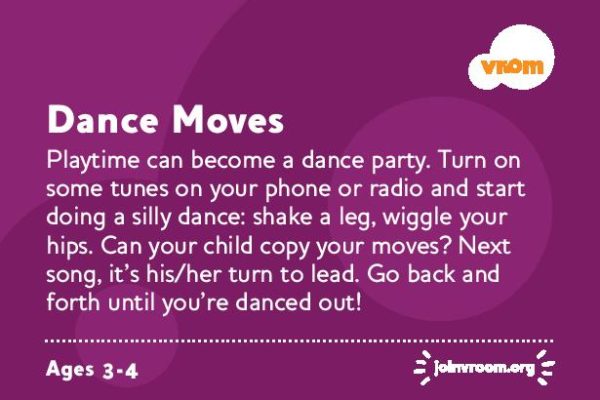OVERVIEW
As children grow into early childhood, their world will begin to expand. They will become more independent and begin to focus more on children and adults outside of the family. They will want to explore and ask about the things around them even more. Their interactions with family and other people will help to shape their personality and their own ways of thinking and moving. Click here to learn more.
Remember that all children develop differently. This means that your child may be really good at some activities and struggle with others. This is normal. Don’t worry! The information on this website is meant to be a guide, not a checklist of things which have to be mastered.
PARENT EXPERIENCE
As your child continues to develop more independence, allow extra time for the completion of tasks. For example, allow a few extra minutes each morning to let your child dress independently. It’s okay to help if your child asks, but encourage them to try. Wearing a shirt backwards for a day won’t hurt. Resist the urge to fix their mistakes.
Keep in mind that children learn through play. Allow your child the time and space to discover and learn, rather than providing instruction all the time. Your role during this time is to provide a safe space for exploration.
Redirecting is often the best strategy when working with your preschooler. If your child is having a hard time waiting for a turn on the swing, try to redirect to an equally fun opportunity - “Why don’t we go down the slide together while you wait?”
Be clear and consistent with your child. Always explain and show your child what behaviors you expect. If you say “no,” be sure to follow up with what you would like done instead. Be clear with simple two to three step directions. For example, say “pick up your toy with your hand, walk to the toy box, and put it in.”
As your child becomes more independent, you may also experience feelings of loss. Do your best to let your child explore the environment. This is just the beginning of your child becoming a unique and independent person.
HEALTH AND ACTIVITY
Safety: As your child explores more, talk about safety – traffic, street signs and safety around strangers. Learn more about how to teach your child about safe touch.
Knowing names is important. Begin to teach your child both your and their first and last name. Your preschooler should also know your address, phone number, and how to make an emergency 911 call.
Teach your child about playground safety, including how to safely walk around the swings.
Food Choices: Talk to your child about how some foods are “anytime” foods because they are healthy and help you grow, but other foods are “sometimes” foods because they have lots of sugar or fat. Explore foods together! Let your child see you enjoying fruits, vegetables, whole grains and drinking lots of water.
Sit down together as a family for meals. At dinner, introduce a new food and have everyone talk about it.
Have your child help you in the kitchen! Remind your preschooler of the importance of hand washing. Teach them about measuring and stirring as you prepare healthy foods together.
Stay Active: Help your child discover alternatives to TV shows and computer games. Play a board game together or build a fort. Check out these tips for reducing screen time. Encourage your child’s imagination. Pretend together to be doctors, teachers, superheroes or animals.
Play active games like Follow the Leader, tag or Simon Says. Click here for more ideas. Have fun exploring nature with your child.
Napping may trail off during preschool years. Click here to learn more about preschoolers and sleep.
Preparing for School: As you start to look ahead to kindergarten with your preschooler, start thinking about vaccinations and preparing your child for school. Check out the Be Ready Kindergarten Guide for more information.
Help your preschooler stay on track by:
- Taking your preschooler to the doctor for well child check-ups. Generally, doctors like to see preschoolers once a year (at ages 3, 4 and 5) to make sure your preschooler is on track developmentally.
- Don’t have a doctor? Check with your insurance to find a list of doctors.
- Don’t have insurance? Contact Larimer Health Connect to find out about insurance options in Larimer County.
- Screenings are a regular part of healthcare. The doctor may ask you to fill out a questionnaire about your observations of your child.
- Have concerns or questions? Write them down, and ask your doctor at your child’s next well child check-up.
FEELINGS AND BEHAVIOR
Playing with Others: Give your child opportunities to play with other children. Consider enrolling your child in preschool, taking your child to the playground, or going to story time at the library.
Help your child learn how to get along with others. When children are encouraged to think about others’ feelings and needs, they tend to get along better with their peers.
Problem Solving: It is important that your preschooler learn to solve problems independently. When your child talks about a problem, listen and help brainstorm a variety of solutions.
Support your child when they make a mistake. Explain that everyone makes mistakes and the importance of admitting it and then trying to fix it. Share examples of when you have made mistakes.
Expressing Emotions: Help your child express feelings. Read picture books together and discuss what emotions the characters are showing. Talk about your own feelings (e.g., Mommy is feeling sad right now. What face does Mommy make when she is sad?)
Transitions: Being asked to switch gears is difficult, especially for preschoolers. Help your child by being consistent and developing routines. Make a daily routine chart with your child using pictures.
LANGUAGE AND LEARNING
Questions: Take time to respond to your child’s questions. When you don’t know the answer, find it together using books, the Internet or other resources. This is another great way to integrate reading into your child’s routine.
Ask your child questions as well. Have your preschooler tell you a story or their thoughts about everyday things. Ask open ended questions, such as “what if…”. This can help you discover how much your child already knows as well – “Where does milk come from?” or “How many tires are on a bicycle?” Click here for more tips.
Explore Letters and Numbers: Have your child trace the letters of their name while spelling it. Explore the letters of the alphabet – fill a bag with things that start with “S,” for example. Read signs around town together. Create a rhyming song to the letters in your child’s name to help remember how it’s spelled.

